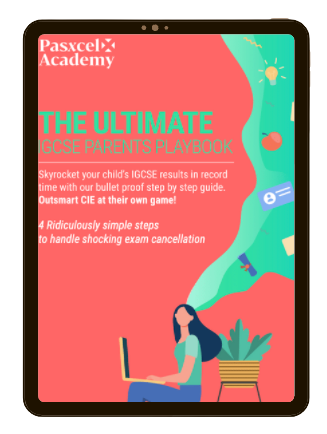Scoring an A* in your IGCSE Chemistry is not as hard as what most students think as questions for the exam are quite straightforward. There are a few issues that make the target difficult to achieve which are as below :
- Incomplete coverage of syllabus.
- Lack of interconnection between topics.
- Weak understanding in fundamental topics like mole concept, electrochemistry, organic chemistry and etc.
- Misunderstanding or overlooking command words.
First, let’s take a look at the syllabus. Quite a number of students have no idea about the syllabus. The syllabus is necessary as a guide for your study plan in order to allocate adequate time before the exam and at the same time to ensure that no topics are missed out.
Here is the index of the syllabus guide :

Let’s break down the areas to focus on based on the syllabus.
- Assessment overview
- Assessment objectives
- Subject content
- Command words
1. Assessment overview
Obviously before sitting for any exam, it’s a must to know the exam format which is elaborated in the assessment overview. A candidate aspiring to score an A* would definitely have to sign up for papers that cover the extended syllabus as well, as without it, the candidate is only able to score a maximum of C.
The screenshot below shows the first 2 papers which focuses on the theory aspect of Chemistry.

As you can see, the time allocation and percentage of mark weightage are also crucial for exam preparation. To give you a perspective, let’s compare Paper 2 and Paper 4. For Paper 2, you are given 45 minutes to answer multiple-choice questions which total up to 40 marks. This averages out to approximately 1.125 minutes (67.5 seconds) per mark. I know that’s a lot of numbers! So to make it simple, let’s keep it at a minute per mark or in this case, per question.
Whereas for Paper 4, you only have 75 minutes to answer questions that total up to 80 marks which means you have less than a minute for each mark. For example, if you have a six marks question you need to complete the question in under six minutes. To be safe, my advice would be to complete the questions minus a minute from the total marks allocated. Say if you have sixteen marks allocated, try to complete all questions within fifteen minutes.
You must continue practising until you’re able to achieve this time management as this can make a difference between an A* or A. If you’re spending too much time on a particular question, it’s best to skip it first and move on to the next one which may be an easy question. You can always come back to it once you’re done with the rest of the questions.
We are now left with the practical aspect of Chemistry which is mainly focused on Paper 5 and Paper 6. The screenshot below shows the details on Paper 5 and 6.

There are extra 15 minutes allocated for Paper 5 as you need to conduct experiments on your own and use the results to answer questions given. There are generally three questions for Paper 5 with two of them requiring you to conduct the experiments.
Whereas for Paper 6, you are given four questions to be completed in an hour. Both papers carry 40 marks in total and have a similar weightage of 20% out of total marks. Even the format of the practical papers is standardized whereby you definitely have a question each on qualitative analysis (QA) and experiment planning. You will be provided with the QA table for Paper 5 but for Paper 6, you need to rely on your memory alone.
If you have not been trained by your teachers for conducting experiments, it’s best to go with Paper 6 instead. Even though you may lack the experience of performing live experiments, you still need to know the apparatus required, how to use them, experimental procedures, tabulation of results and also interpreting them.
2. Assessment objectives
As you can see in the screenshot below, the assessment objectives are divided into three parts which test different skills required by the student. Please also take note of the command words used for different assessment objectives.
For example, AO1 (knowledge with understanding) uses command words like define, state, describe, explain or outline. Whereas in AO2 (handling information and problem solving), you have command words like predict, suggest, calculate or determine.

The weighting for assessment objectives also varies according to the paper. As you can see in the screenshot below, AO1 takes 50% of the weighting in your IGCSE Chemistry exam which means without complete knowledge and understanding of the syllabus, you are at a great disadvantage of losing marks from questions related to this objective.
Similarly, it applies to AO2 and AO3 as well, carrying 30% and 20% respectively. We can also look at the assessment objectives as a percentage from each of your exam papers. As you can see, AO3 is only tested in Paper 5 or 6. As for Paper 2 and 4, 63% is on AO1 which goes back to the crucial point of complete understanding of the syllabus. You can’t afford to skip any topics.

3. Subject content
We have a total of 14 topics in the IGCSE Chemistry syllabus content. There are also a number of subtopics for each of them which varies according to the topic. I want to highlight two points about the syllabus which are as below.
The first one being the interconnection between topics. I mentioned that lack of this will be a hindrance to achieving an A* in your exam. The subject content actually helps you with this. If you take a look at topic 5 on electrochemistry, they have mentioned the list of other topics that can be related to this topic as shown in the snapshot below.

When you’re learning about simple cells, it’s a must to relate it with reactivity series and redox which are from topics 10 and 7 respectively. If you revise connected topics together, you will be able to view the subject from a wider angle which will definitely deepen your understanding as well.
The second point to note is the things that you need to know from the syllabus. As you can see in the snapshot above, technical details and diagrams are not required for electrolysis of brine but it is given in the textbook. In conclusion, you don’t need to know or master certain things in the textbook but instead, refer to the syllabus for guidance as it shows you what is required.
4. Command words
Most teachers and students spend all their time mastering the syllabus and leave none to master the command words used by the IGCSE Chemistry examiner.
The command word is how the examiner communicates with the candidate on what he/she expects out of an answer. For example, let’s compare and contrast two command words that most students are confused about; discuss and describe.
“Describe” requires students only to give the main characteristics and features of a topic whereas “Discuss” entails that you talk about both sides of the argument (advantages and disadvantages) and provide an answer that is structured as well as in-depth.
There are 17 command words for IGCSE Chemistry. Each of them requires a specific action from the candidate.
For example, it might not be the most efficient use of time to write a whole paragraph on a question that tells you to just state the answer. You might think that this is obvious but according to the marking scheme and the IGCSE Chemistry examiner report, this is where most mistakes are made.
To help you navigate the rather confusing list of command words, I’ve shown them below for your reference during your revision period.

By reviewing these four areas in the syllabus, you will set yourself up for success from day one.
You can also check out our detailed guide for :
- IGCSE Biology
- IGCSE Physics
- IGCSE Mathematics
- IGCSE English As Second Language
- And many more to help you ace your IGCSE
At Pasxcel, we’ve coached each one of the students to become a success story. If you need more help in your IGCSE, please drop us a message for online tuition classes or our IGCSE Ascension program.
Written by Ms Devina, Master Teacher of Pasxcel Academy

Biology, Chemistry & Science
M.D (Doctor of Medicine)
Teacher Rasyad studied Theoretical Physics and for a while he was working as a theoretical physicist. His area of research was Theoretical Nuclear Astrophysics and Particle Physics. His passion for teaching Mathematics and Physics led him to become a teacher with Pasxcel where he aims to instil in his students the joy of finding things out. His classes are usually very broad ranging and engaging. And rather than just explaining the concepts, he ties it in with the students’ experiences, the mundane then becomes the beautiful. His classes tend to have a habit of going into far off regions where he takes his students on a tour of the universe, from the very big to the very small, stretching the limits of their imaginations.














